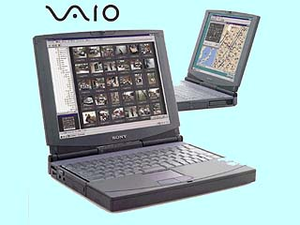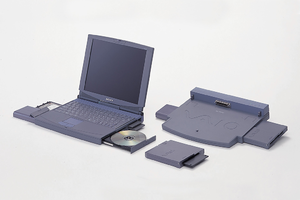PCG-7**: Difference between revisions
Resident007 (talk | contribs) m (→Overview) |
Romanio0089 (talk | contribs) mNo edit summary |
||
| (5 intermediate revisions by 2 users not shown) | |||
| Line 1: | Line 1: | ||
==Overview== | ==Overview== | ||
The Sony VAIO PCG-700 Series were the first laptops to be released by Sony under the VAIO brand. They were launched on July 1, 1997 in Japan and, afterwards, in the United States. | [[File:PCG-705.png|thumb|PCG-705]]The Sony VAIO PCG-700 Series were the first laptops to be released by Sony under the VAIO brand. They were launched on July 1, 1997 in Japan and, afterwards, in the United States. | ||
The 700 Series featured removable 3.5" floppy disk drive, removable 14x CD-ROM, 33.6 kbit/s integrated modem, 12.1" screen, 2.1 GB hard disk drive, 2 MB VRAM, 128 MB maximum RAM, IrDA port, lithium-ion battery, with optional second battery and an optional docking station with i.Link, USB, mouse, keyboard, Ethernet and SCSI ports. | The 700 Series featured removable 3.5" floppy disk drive, removable 14x CD-ROM, 33.6 kbit/s integrated modem, 12.1" screen, 2.1 GB hard disk drive, 2 MB VRAM, 128 MB maximum RAM, IrDA port, lithium-ion battery, with optional second battery and an optional docking station with i.Link, USB, mouse, keyboard, Ethernet and SCSI ports. | ||
[[File:PCG-707-Dock.png|thumb|PCG-707 with its | [[File:PCG-707-Dock.png|thumb|PCG-707 with its Docking Station and 3.5' drive, which could be used as an external or internal drive]] | ||
==Detailed Specs== | ==Detailed Specs== | ||
| Line 30: | Line 27: | ||
==Daily Usage Today== | ==Daily Usage Today== | ||
These days, laptops of this era are only suitable for retro gaming and offline usage, such as editing basic text documents and spreadsheets, and it is only sufficient for playing early Windows games, and playing DOS games on it will yield better results. | These days, laptops of this era are only suitable for retro gaming and offline usage, such as editing basic text documents and spreadsheets, and it is only sufficient for playing early Windows games, and playing DOS games on it will yield better results. | ||
==Resources== | ==Resources== | ||
If a link is broken, please input the URL in the [http://web.archive.org/ Wayback Machine]. | |||
==== Recovery Discs ==== | |||
These discs are not compatible with [[Sony VAIO Recovery Patcher (SVRP)|SVRP]], but we are working on a patcher for older recoveries. | These discs are not compatible with [[Sony VAIO Recovery Patcher (SVRP)|SVRP]], but we are working on a patcher for older recoveries. | ||
{| class="wikitable" | {| class="wikitable" | ||
| Line 39: | Line 39: | ||
| PCG-748||[https://archive.org/details/pcg748 Internet Archive] | | PCG-748||[https://archive.org/details/pcg748 Internet Archive] | ||
|} | |} | ||
==== Manuals and Useful Links ==== | |||
{| class="wikitable" | {| class="wikitable" | ||
|+Manuals | |+Manuals | ||
|- | |- | ||
| PCG-705||PDF | | PCG-705||[https://download.vaiolibrary.com/manuals/pcg-7**/PCG-705_User_Guide_1997.pdf PDF] | ||
|} | |} | ||
{| class="wikitable" | {| class="wikitable" | ||
| Line 58: | Line 59: | ||
| PCG-731, PCG-733, PCG-737||[https://www.sony.jp/products/Consumer/PCOM/VAIO/Note737/index.html Sony JP] | | PCG-731, PCG-733, PCG-737||[https://www.sony.jp/products/Consumer/PCOM/VAIO/Note737/index.html Sony JP] | ||
|} | |} | ||
[https://www.youtube.com/watch?v=aa6MNo_y6Vc | ==== Guides ==== | ||
{| class="wikitable" | |||
|- | |||
|PCG-729 Disassembly||[https://www.youtube.com/watch?v=aa6MNo_y6Vc YouTube] | |||
|} | |||
==Credits== | ==Credits== | ||
[https://sony.com/ Sony], [[wikipedia:Sony_Vaio_700_series|Wikipedia]], [https://www.inversenet.co.jp/pclist/maker/SONY-note.html inversenet.co.jp] | [https://sony.com/ Sony], [[wikipedia:Sony_Vaio_700_series|Wikipedia]], [https://www.inversenet.co.jp/pclist/maker/SONY-note.html inversenet.co.jp] | ||
Latest revision as of 17:33, 22 December 2024
Overview
The Sony VAIO PCG-700 Series were the first laptops to be released by Sony under the VAIO brand. They were launched on July 1, 1997 in Japan and, afterwards, in the United States.
The 700 Series featured removable 3.5" floppy disk drive, removable 14x CD-ROM, 33.6 kbit/s integrated modem, 12.1" screen, 2.1 GB hard disk drive, 2 MB VRAM, 128 MB maximum RAM, IrDA port, lithium-ion battery, with optional second battery and an optional docking station with i.Link, USB, mouse, keyboard, Ethernet and SCSI ports.
Detailed Specs
Processor: Intel Pentium MMX 150MHz (PCG-705), 166MHz (PCG-707), 200MHz (PCG-717 and PCG-731), 233MHz (PCG-719 and PCG-735), 266MHz (PCG-748)
Graphics: NeoMagic MagicGraph 128XD (2MB VRAM)
Chipset: Intel 430TX
Memory: 16MB SDRAM (PCG-705), 32MB (PCG-707, PCG-719 and PCG-731), 64MB (PCG-729, PCG-735 and PCG-748)
Display: 800x600 (PCG-705 and PCG-717), 1024x768 (PCG-707, PCG-719, PCG-729, PCG-731, PCG-735 and PCG-748)
Storage: 2.5" IDE 2.1GB
Audio: ESS AudioDrive ES1878 (Sound Blaster Pro compatible)
Weight: 2.4kg
Original OS: Microsoft Windows 95
MSRP: ~$2900-$3700
Daily Usage Today
These days, laptops of this era are only suitable for retro gaming and offline usage, such as editing basic text documents and spreadsheets, and it is only sufficient for playing early Windows games, and playing DOS games on it will yield better results.
Resources
If a link is broken, please input the URL in the Wayback Machine.
Recovery Discs
These discs are not compatible with SVRP, but we are working on a patcher for older recoveries.
| PCG-705C/707C | Internet Archive |
| PCG-748 | Internet Archive |
Manuals and Useful Links
| PCG-705 |
| PCG-705 | Sony JP |
| PCG-707 | Sony JP |
| PCG-713, PCG-715, PCG-719 | Sony JP |
| PCG-723, PCG-726, PCG-729 | Sony JP |
| PCG-731, PCG-733, PCG-737 | Sony JP |
Guides
| PCG-729 Disassembly | YouTube |

